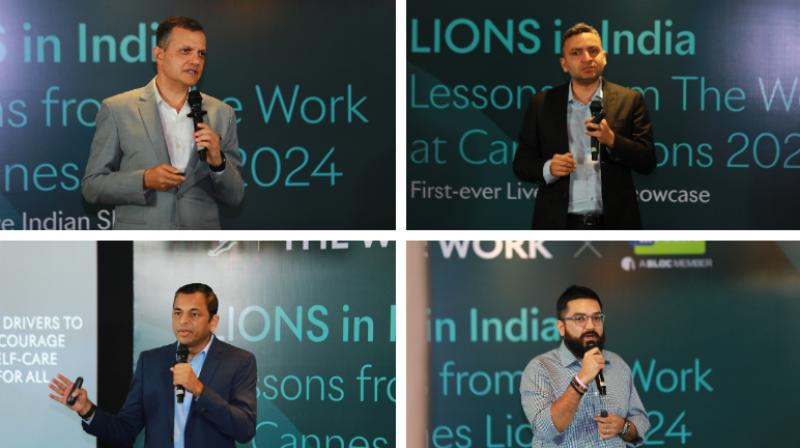The second day of ‘Lions in India’, discussed the role of marketing in healthcare, the need for self-care in India and the lack of authentic and inclusive elements in healthcare advertising.
The speakers at the event included Manish Anandani, managing director- India, Kenvue; Shivam Puri, managing director and chief executive officer, Cipla Health; Sandeep Verma, country head- India, Bangladesh and Sri Lanka, consumer health, Bayer; and Kartik Johari, vice president- marketing and commerce, Nobel Hygiene.
Anandani opened the session by explaining the importance of the chief marketing officer's role in today’s world.
He said, “There are several things that are changing overall in the marketing space. The consumers today are asking what is in it for me, in other words, personalisation. That’s becoming very important and this evolution of the consumer is forcing many of the marketers to think a little differently. The second part is about ‘many Indias.’ One solution doesn’t fit all in India. What works in one geography will not necessarily work in another geography because the tastes and expectations are different."
He pointed out the fact that today, marketers have to be more commercial and they must be involved in every part of the business rather than just focusing on the brand.
“According to me, digital marketing doesn’t exist, it’s marketing digitally, which means whatever one does in marketing has to have a digital component to it. That includes sales and supply chain - they. have to have a digital component. The CMOs role is about how to work across various functions to bring the piece together, rather than just working in silos. Also, today, it's very important that brands don't just make sure that influencers enter their world, but it's the other way around how a brand enters the influencer ecosystem, which is more important," expressed Anandani.
Puri then went on to spotlight the fact that healthcare is about elevating the purpose of a brand and how one is privileged to be a marketer in this space.
He said, “Every time you manage to make the consumer habits shift, you are changing their lives for good. We have competitors from multiple brands but eventually success of every single brand in healthcare translates into a better, happier, healthier consumer. The responsibility of the marketer is to make amazing products accessible to consumers and translate the stories into communication which is understood by the consumer so that it translates into adoption.”
Verma echoed the above sentiments and stressed the need for self-care in India.
“As a land of billions of people and billions of dreams, we are definitely dream rich but health poor. Why is self-care so critical for India? We have the maximum number of people suffering from cardiovascular diseases, diabetes, respiratory diseases, even cancer and all non-communicable diseases (NCDs). Self-care can reduce your own healthcare cost and also eventually reduce the burden on the country’s healthcare system,” he explained.
Citing a lack of awareness and real knowledge of what is happening and limited understanding regarding self-care as the major hurdles in the space today, Verma mentioned the key drivers that can encourage self-care in the country.
He noted, “If you make health and wellness easy to achieve, it may get practised. The easiest way to get somebody to change a habit is to make it easy. If you make health and wellness accessible for all, irrespective of their social, demographic, or economic divide, and get the consumers to become proactive in their own healthcare choices, that's self-care for you."
Stressing the role of technology in self-care, Verma said, "AI can play a very big role in self-care. Through its adaptive learning process, AI can absorb your data, analyse it and can offer personalised fitness recommendations. As your life stage changes, so does your self-care need changes. AI comes in there and gives you customised self-care, based on your life stage. A lot needs to be done here in India to democratise self-care for everyone.”
Johari concluded the talk by addressing the issue of authenticity and inclusivity in the healthcare advertising space.
Talking about the stereotypes prevailing in the communication advertisers disperse, he asserted, “As marketers, we have been stuck in this devolving race to the bottom in the search for the lowest common denominator in advertising. We want to ensure that we speak to the masses and we try to tailor our message to make it the most bland, most vanilla, most stereotyped portrayal possible. And that's a huge disservice that we do not only to advertising but also to our brands."
"I think we all, as individuals, are composed of many layers of individuality, none of which are peeled back or explored when it comes to storytelling in advertising. It is when you adopt an authentic, inclusive approach, where you're mirroring the complexities of life that your consumers, your families, yourselves and the society as a whole are undergoing, there is magic that is waiting to be involved,” said Johari.












